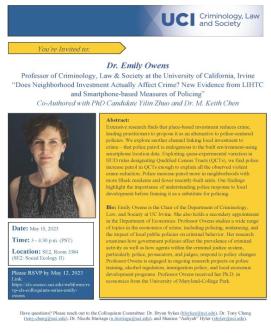Abstract:
Extensive research finds that place-based investment reduces crime,
leading practitioners to propose it as an alternative to police-centered
policies. We explore another channel linking local investment to
crime—that police patrol is endogenous to the built environment-using
smartphone location data. Exploiting quasi-experimental variation in
HUD rules designating Qualified Census Tracts (QCTs), we find police
increase patrol in QCTs enough to explain all the observed violent
crime reduction. Police increase patrol more in neighborhoods with
more Black residents and fewer recently-built units. Our findings
highlight the importance of understanding police response to local
development before framing it as a substitute for policing.
Bio: Emily Owens is the Chair of the Department of Criminology,
Law, and Society at UC Irvine. She also holds a secondary appointment
in the Department of Economics. Professor Owens studies a wide range
of topics in the economics of crime, including policing, sentencing, and
the impact of local public policies on criminal behavior. Her research
examines how government policies affect the prevalence of criminal
activity as well as how agents within the criminal justice system,
particularly police, prosecutors, and judges, respond to policy changes.
Professor Owens is engaged in ongoing research projects on police
training, alcohol regulation, immigration policy, and local economic
development programs. Professor Owens received her Ph.D. in
economics from the University of Maryland-College Park.
